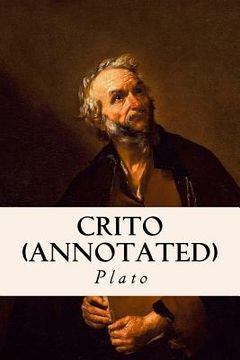Synopsis "Crito (annotated) (in English)"
Crito is a dialogue by the ancient Greek philosopher Plato. It depicts a conversation between Socrates and his wealthy friend Crito regarding justice, injustice, and the appropriate response to injustice. Socrates thinks that injustice may not be answered with injustice, and refuses Crito's offer to finance his escape from prison. The dialogue contains an ancient statement of the social contract theory of government The dialogue takes place in Socrates' prison cell, where he awaits execution. He is visited before dawn by his old friend Crito, who has made arrangements to smuggle Socrates out of prison to the safety of exile. Socrates seems quite willing to await his imminent execution, and so Crito presents as many arguments as he can in order to persuade Socrates to escape. On a practical level, Socrates' death will reflect badly on his friends--people will think they did nothing to try to save him. Also, Socrates should not worry about the risk or the financial cost to his friends; these they are willing to pay, and they have also arranged to find Socrates a pleasant life in exile. On a more ethical level, Crito presents two more pressing arguments: first, if he stayed, he would be aiding his enemies in wronging him unjustly, and would thus be acting unjustly himself; and second, that he would be abandoning his sons and leaving them without a father. Socrates answers first that one should not worry about public opinion, but only listen to wise and expert advice. Crito should not worry about how his, Socrates', or others' reputations may fare in the general esteem: they should only concern themselves with behaving well. The only question at hand is whether or not it would be just for Socrates to attempt an escape. If it is just, he will go with Crito, if it is unjust, he must remain in prison and face death. At this point, Socrates introduces the voice of the Laws of Athens, which speaks to him and proceeds to explain why it would be unjust for him to leave his cell. Since the Laws exist as one entity, to break one would be to break them all, and in doing so, Socrates would cause them great harm. The citizen is bound to the Laws like a child is bound to a parent, and so to go against the Laws would be like striking a parent. Rather than simply break the Laws and escape, Socrates should try to persuade the Laws to let him go. These Laws present the citizen's duty to them in the form of a kind of social contract. By choosing to live in Athens, a citizen is implicitly endorsing the Laws, and is willing to abide by them. Socrates, more than most, should be in accord with this contract, as he has lived a happy seventy years fully content with the Athenian way of life. If Socrates were to break from prison now, having so consistently validated the social contract, he would be making himself an outlaw who would not be welcome in any other civilized state for the rest of his life. And when he dies, he will be harshly judged in the underworld for behaving unjustly toward his city's laws. Thus, Socrates convinces Crito that it would be better not to attempt an escape.

